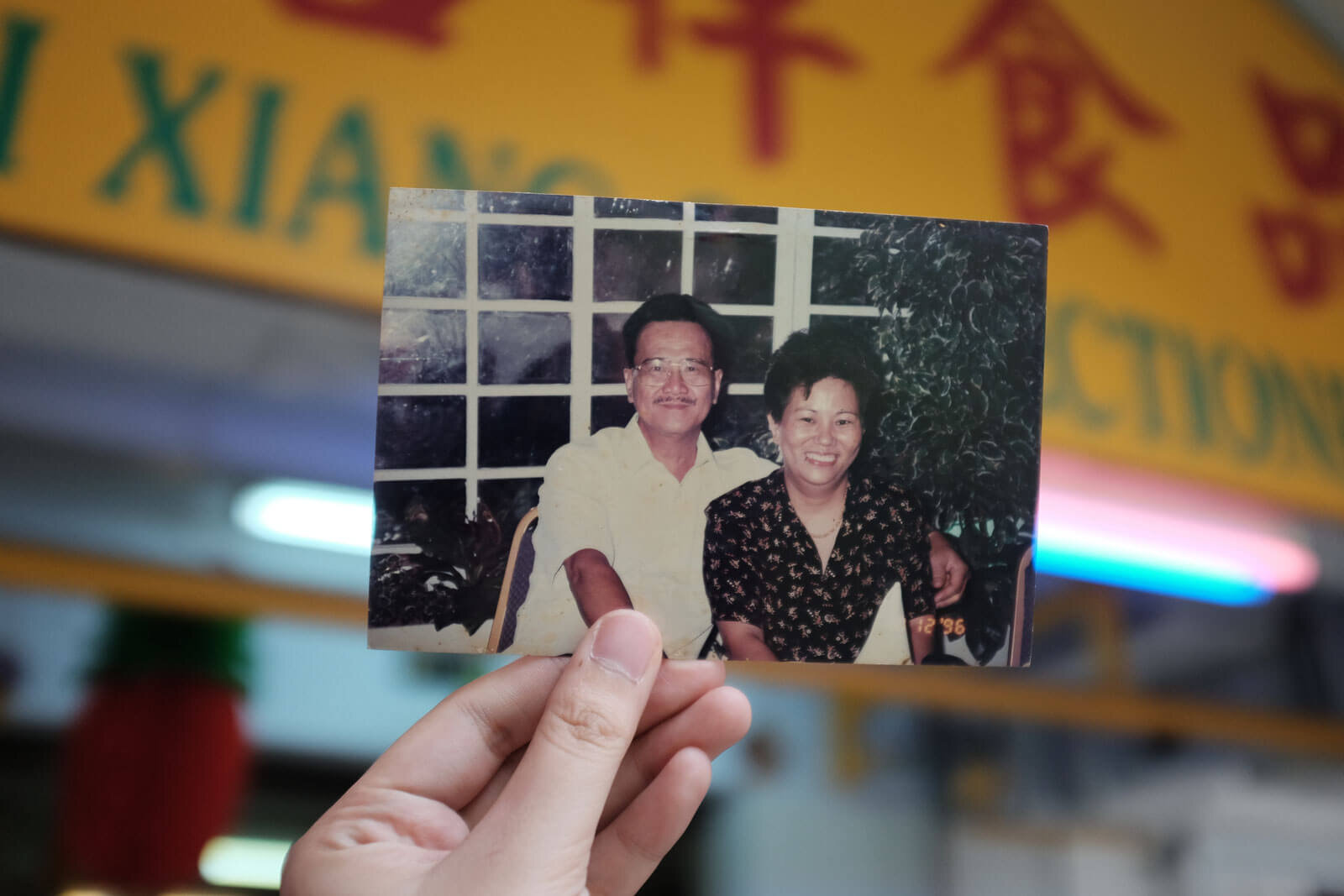Falling for the girl next door
Issue #1
By Sharanya Pillai
Zainal and Norsiah share a tender moment at what would have been the former Kampung Kuchai (now Geylang Lorong 3). In the background is Block 15, Upper Boon Keng Road, where many orang laut from Kampung Kuchai were resettled in.
Those were idyllic times. Hours of playing hide-and-seek with the other kampung children. Days spent sipping tea and chatting with the neighbours. Years of a blissful childhood growing up as a member of Kampung Kuchai – a village of the orang laut, descendants of Singapore’s native inhabitants.
But most importantly for Zainal Ismail, Kampung Kuchai led him to the love of his life.
The year was 1958. Twelve-year-old Zainal was popular in the kampung, a face known to everyone. He grew up in a tight family, with his parents and two younger brothers. Home was a wooden hut on stilts, sitting on the river, like so many others around them. Together, the collection of kampung houses stood like a man-made island in the river.
He studied at the Guillemard Malay School, a few streets down from the kampung (see map attached). Every Friday, he attended sermons at the mosque at Geylang Lorong 11. Sometimes, he would head to the community centre to watch television – a rarity in those days.
Located at Geylang Lorong 3, the kampung was a world unto itself. Its inhabitants even spoke a different language, Selat, the dialect of the orang laut. Kampung Kuchai was Zainal’s entire world. It was small, but it was enough. Here, every single person stood out larger-than-life.
One of them was Norsiah Bte Borhan, the soft-spoken girl who lived a few doors away. She was three years younger than him; she attended the Geylang Malay Girls’ School. Norsiah showed up to the jaunts of the neighbourhood children. They would play the usual games – goli, teng teng, sapu sapu ringgit. Finding a bicycle tyre rim was always the best – they could beat it along with a stick.
They lived, studied and played side-by-side. But Zainal and Norsiah barely spoke to each other. To Zainal, she was just the introverted girl too shy to step out of her house. To Norsiah, he was just the playful boy who never seemed to stay within the confines of his abode. When she looked out her door, Norsiah could spot Zainal, hanging out at the sarbar tea stall. She never really thought much about him.
But over a decade later... a spark.
A delicatedance
The year was 1971. Zainal was now a young man in the military, among the pioneers of the Singapore army. After he finished school, Zainal had spent a few months working for the sarbar tea stall, earning a few dollars delivering tea to the offices in town. When the government issued a call for army recruits in 1966 – even before National Service became mandatory – Zainal signed on. He served in the engineering division.
The work was tough, but it was good. At this time, change was afoot throughout Singapore. Buildings were sprouting up. New roads were being paved.
And in 1971, Kampung Kuchai was marked for demolition.
But in the village, it was as though time had stood still. Zainal still enjoyed his long chats at the tea stall, hanging out with the neighbourhood men he had grown up with. Home, the community centre, the mosque – the places he had grown up with were there, untouched by urban life.
Zainal and Norsiah take a stroll outside a factory occupying the site of Lee’s Rubber Factory back in 1987. The river is long gone, and replaced with concrete.
And then there was Norsiah, now a sweet-faced woman in her early 20s, still unmarried.
Zainal found himself attracted to her, even if they never spoke. The boys laughed at him – How can you aspire for her? She wouldn’t even talk to you!
Well, a man could always dream. Zainal took his chance. One day – he can’t quite recall where – he just asked her: “Will you go out with me?” Point blank. She left without a reply.
All this while, no one quite knew what was in Norsiah’s heart. The soft-spoken girl had in fact hoped to marry someone outside of the kampung – unknown to everyone, she longed for adventure! But then she considered Zainal’s proposal. And she made up her mind. Some days later, Norsiah took out a pen and quickly wrote on a piece of paper. She folded it and passed it to one of the neighbourhood kids, giving him instructions on where to deliver it.
Zainal was lazing about in the community centre, watching television. One of the neighbourhood kids came up to him, and handed him a piece of paper.
Scribbled on it: a date for their first meeting.
Thatheady feelingcalled love
The first date was modest. They met at the shophouses in front of the Happy World amusement park*. They picked one of the shops, and settled to have tea and snacks. The food was just a distraction; the conversation was the real substance. They spoke about everything – the kampung, their family and friends. The talk was always casual, down-to-earth – never mushy, never pretentious – with two pragmatists in love.
Slowly, Zainal and Norsiah ventured to other locations. They would take a bus to the seaside at Changi*, or head to the Shenton Way Carpark*. Sometimes, they would treat themselves to the fares of the hawker pushcarts along Beach Road* – mee goreng, satay, tulang soup.
And then, they began watching the latest Hindi blockbusters together, like Hathi Mere Sathi, or practically any film starring Amitabh Bachchan. Sometimes, they would catch the same film twice, even thrice. Queen Theatre* and Taj Theatre* were all favourite locations for those secret meetings. Norsiah’s mother would be fuming if she knew about these excursions.
But it wasn’t a secret they could keep forever. Eventually, some friends found out, but thankfully kept the news to themselves. On Hari Raya Puasa, the secret couple even headed out together with Zainal’s other friends and their partners.
As Norsiah and Zainal grew closer, the question of marriage seemed to answer itself without the need for a formal proposal. In early 1973, they decided that this would be for life. According to traditional customs, Zainal sent one of his relatives to Norsiah’s parents to seek her hand.
This year, they celebrate 46 years of marriage.
*Secret paktor spots of the 1970s
*Secret paktor spots of the 1970s
Even as the tides turn
Seated at his dining table in his Pasir Ris flat, Zainal, now in his 70s, pores over a set of photographs of the kampung I had brought with me. Once in while, his eyes light up when he spots a familiar face. In a picture of men dressed up as sailors, his uncle who taught him how to fish. Within the photo of the village councilmen, a close friend’s father-in-law. In another photograph of the village elders, Norsiah’s grandfather.
Norsiah interrupts us with a plate of hot pisang goreng and cups of thick, milky tea. “Don’t be shy, help yourself,” she urges me. In front of us, two little boys bolt out of the room; one of them steals a coy glance at me. “My grandsons,” Norsiah informs me with a laugh.
I had met the couple two days earlier at the Upper Boon Keng Food Centre, at the invitation of Zainal’s brother, Nassir Ismail. Interestingly, Nassir has been on a personal quest to document the history of Kampung Kuchai and the orang laut. When I approached him enquiring about love stories among the orang laut, he immediately had me meet with Zainal and Norsiah. But the couple were too shy to answer my questions in a public space.
In the comfort of their home, the coyness evaporated. Zainal did most of the talking, recalling the intricacies of their love story, pausing at some points to laugh. When I turned the questions to her, Norsiah relayed the quiet confidence of a woman who knew what exactly she had been looking for in life.
The kampung was where they found each other. But just as Zainal and Norsiah’s relationship began to blossom, they had to bid farewell to the place they grew up. In 1971, Zainal relocated to Block 11 in Upper Boon Keng Road, while Norsiah moved to a flat in Whampoa with her parents. The wedding was held in the Whampoa flat.
After marriage, the couple moved to the army quarters in Queen’s Close, in Queenstown. They went on to have four daughters, and subsequently, 12 grandchildren.
While Kampung Kuchai is long gone, the couple hold fond memories of the place they grew up and found each other. “It was really gotong royong,” Norsiah says, in reference to the Malay term for community spirit. “If you had a wedding, you don’t even need to send invitations; the whole village would come together to help with it.”
Zainal quips that he sometimes finds himself slipping back into his native tongue of Selat. His daughters, who grew up speaking Malay and English, often gave him quizzical looks when that happened, he adds.
“This generation may not know about the kampung life, but we try to remember some little things from it,” he says. And then, of course, there’s Norsiah, who’s been by his side all along.
Even as it reached its final days, Kampung Kuchai birthed a new love story – and outlived itself.
Issue 5 drops
Broken heart, broken book. Explore Singapore's past through the lens of breakup stories.
Read other stories:
Love, luck and prosperity
For a long time, the ang ku kueh, or red tortoise cake, was food offered only to the Chinese gods and deities. Not until the 1980s, when Mr and Mrs Toh broke the mould and turned it into an everyday snack for all.
For better, for worse
For years, we thought we knew a lot about Chee Soon Juan, the vilified opposition leader. But they say there are always two sides to a story, and that is his personal life as a loving family figure: a husband, and a father.








